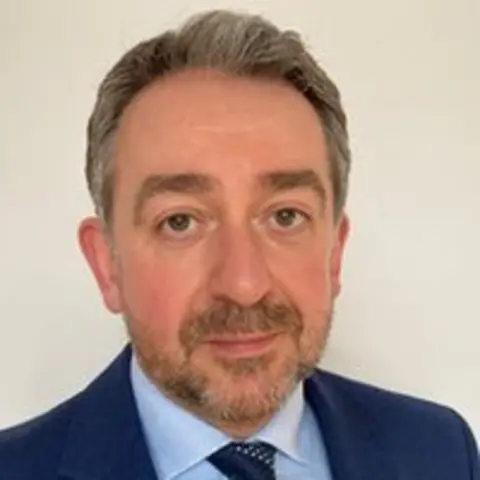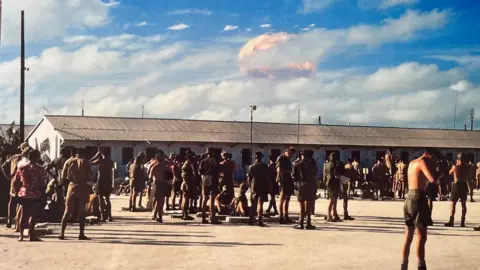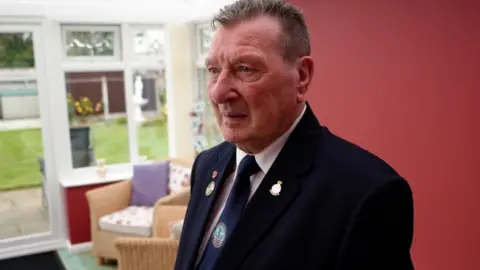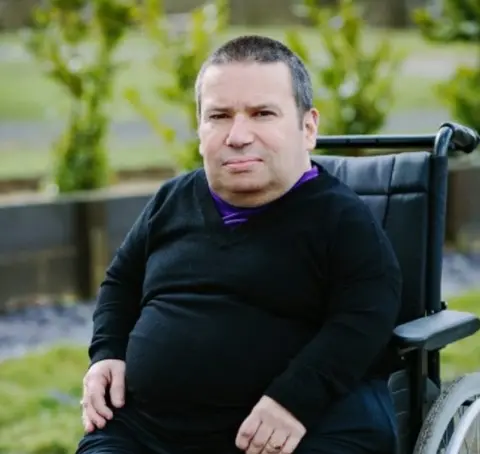Nuclear bomb test veterans relaunch legal action

 Eric Barton
Eric BartonVeterans of the UK's nuclear weapons tests are attempting to relaunch a battle for compensation a decade after being legally blocked from suing the government.
Campaigners say newly discovered documents suggest nuclear chiefs may have known the men suffered radioactive damage.
More than 22,000 personnel worked on detonations in Australia and the South Pacific in the 1950s and 1960s.
Campaigners believe personnel suffered cancers and had children with birth defects because of radiation.
The Ministry of Defence has repeatedly said large studies have found no link between the tests and ill health - and that it is not hiding documents from the veterans.
In 2012, the Supreme Court narrowly ruled that more than 1,000 veterans could not sue the Ministry of Defence because they had run out of time to bring their case.
But recently found documents suggest the military have long held documents detailing blood and urine tests from personnel.
One of the documents seen by the campaign shows concerns about a pilot's blood after he had been flying scientific instruments through mushroom clouds.
The men and their families now plan to take the Ministry of Defence to court because they believe there could be thousands more such records.

If the records exist and prove military chiefs suspected radiation damage, that could lead to a last attempt at getting compensation.
'Guinea Pigs'
Eric Barton, 82, of the "Labrats" campaign group, said British personnel had been treated like guinea pigs.
He suffered cancer and received compensation from the American military because he had witnessed six test denotations of its bombs. But friends who witnessed British bombs have not received any money at all.
"The British government has for years said, 'you prove it'," said Mr Barton.
"Well, we are now finding documents that are proving it - that the MOD has been covering everything up for years and years and years.
"People deserve compensation [from the British]," he says. "I know it's taken years and years and years - but a fight is a fight. Keep going. You don't give up in the first round. You don't give up in second round. You keep going."
A spokesman for the government said it was grateful to all the personnel who had taken part in the nuclear testing programme - and a new medal would recognise their service.
The Ministry of Defence said it could not comment on the potential legal action - but insisted there were no missing records to be found.
"No information is withheld from veterans," said the spokesman.
"Any medical records taken either before, during or after participation in the UK nuclear weapon tests are held in individual military medical records in the government's archives, which can be accessed on request."
Questions from children
 Steve Purse
Steve PurseThat's not accepted by the veterans and their families.
Steve Purse's father David served in the RAF at the 1962 tests in Australia. Years later, Mr Purse, from Prestatyn in Denbighshire, North Wales, was born with a complicated series of disabilities and conditions. He says this must have been linked to radiation damage passed down to him.
When he asked the Ministry of Defence for records of blood tests taken from his father, officials confirmed that it held information - but could not release it under the Freedom of Information Act.
"We've got documentary evidence that blood and urine samples were taken from my father when he served in Maralinga in South Australia," he said.
"We know he was exposed to radiation.
"We need as much information to help resolve some of these questions."
Matthew Jury, one of the veterans' lawyers, said Parliament had been told in 2018 that no blood records could be found - but it was now clear from the documents recovered so far that tests had been ordered, taken and analysed.
"When the veterans request their files, the data is suspiciously absent. If the tests weren't taken it was negligent. If they were and showed damage, then it's a cover-up. And if they showed no damage, then withholding them causes trauma."
The campaigners - who are holding an annual reunion this week - say they and their lawyers want to track down as many surviving veterans as possible around the world to join a group attempt to force disclosure of documents at the High Court.
They are also appealing to retired personnel from across the Commonwealth to join them, as well as members of indigenous communities in Australia or Kiribati.
